必修三 Unit2 Healthy eating--Reading课件 (共71张PPT)
文档属性
| 名称 | 必修三 Unit2 Healthy eating--Reading课件 (共71张PPT) |
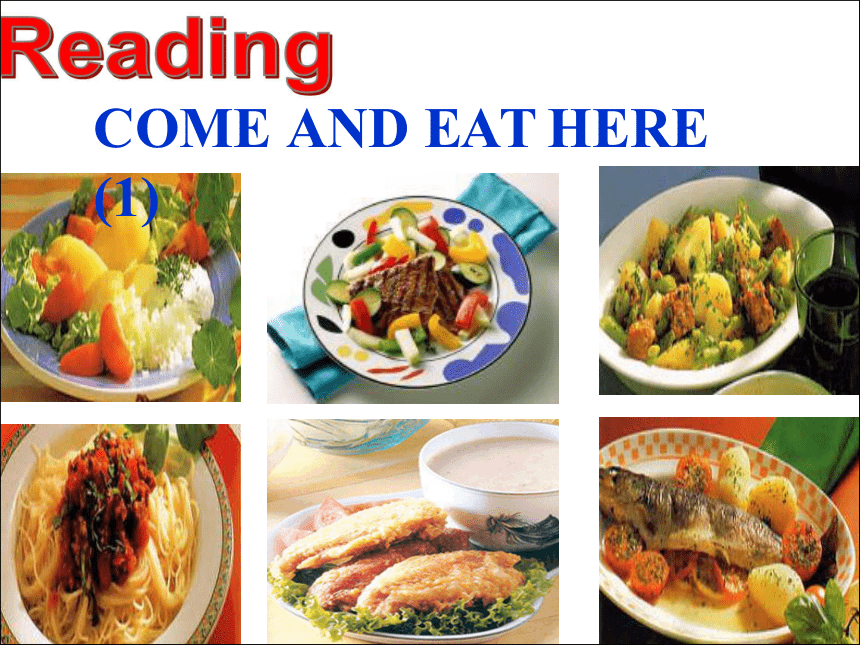
|
|
| 格式 | zip | ||
| 文件大小 | 1.3MB | ||
| 资源类型 | 教案 | ||
| 版本资源 | 人教版(新课程标准) | ||
| 科目 | 英语 | ||
| 更新时间 | 2018-11-15 00:00:00 | ||
图片预览

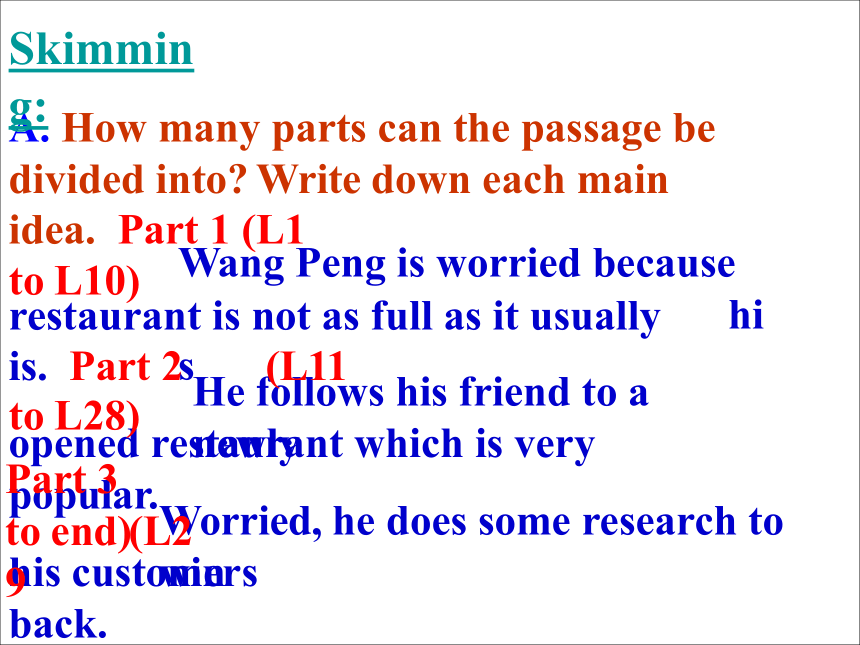
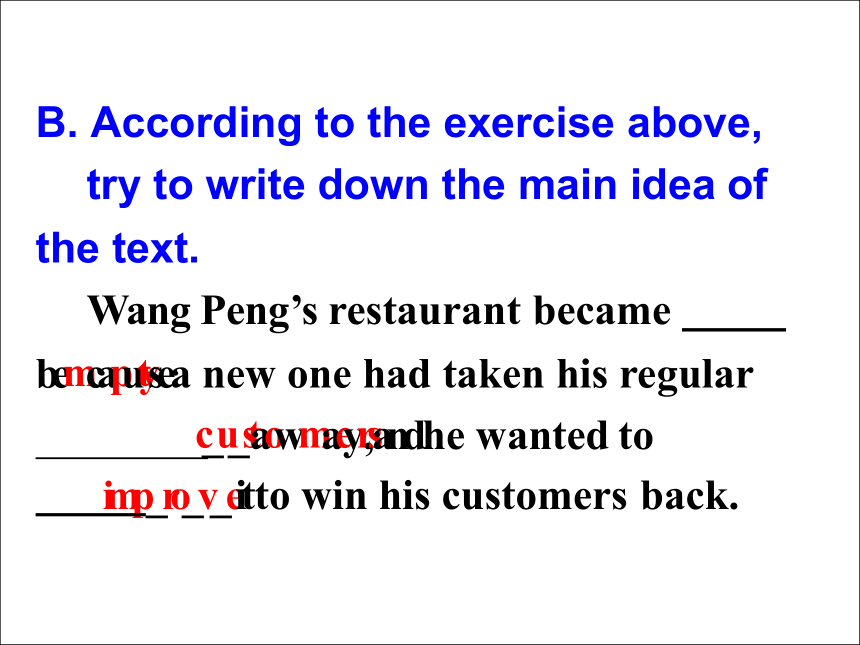
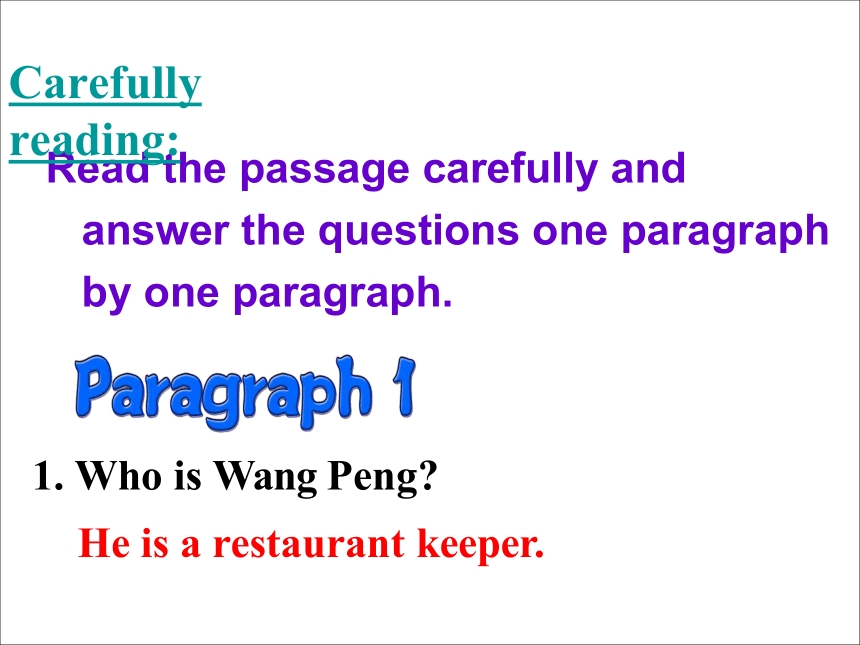
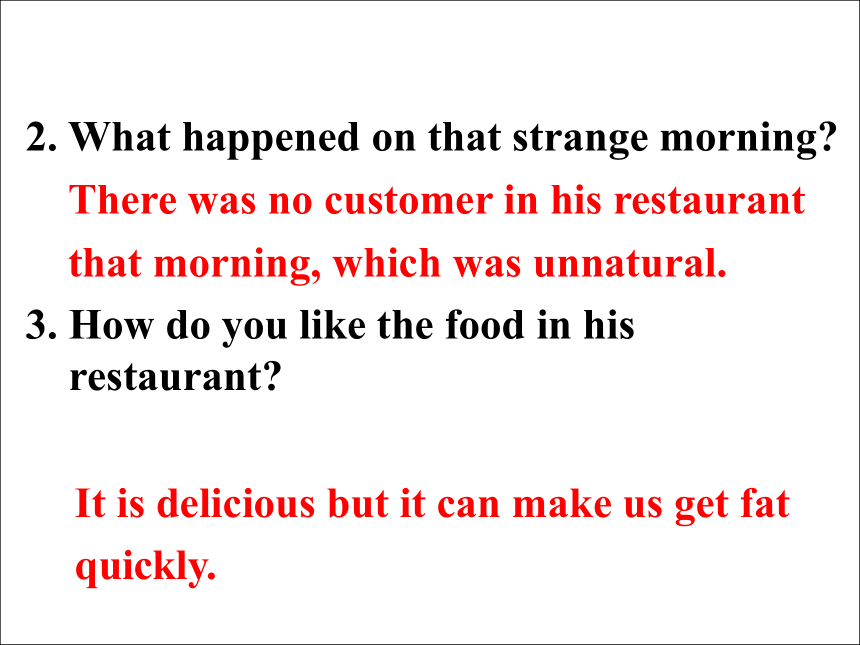
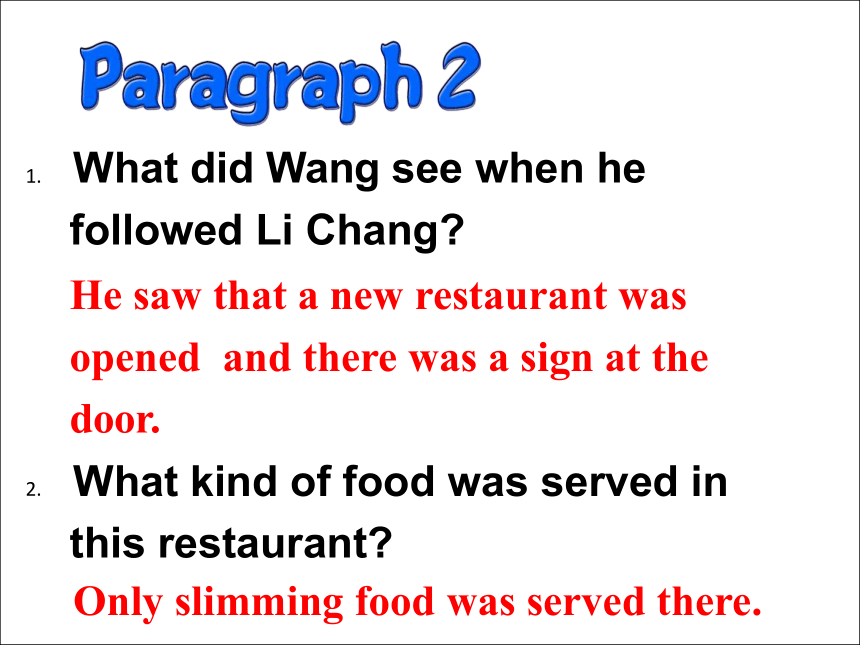
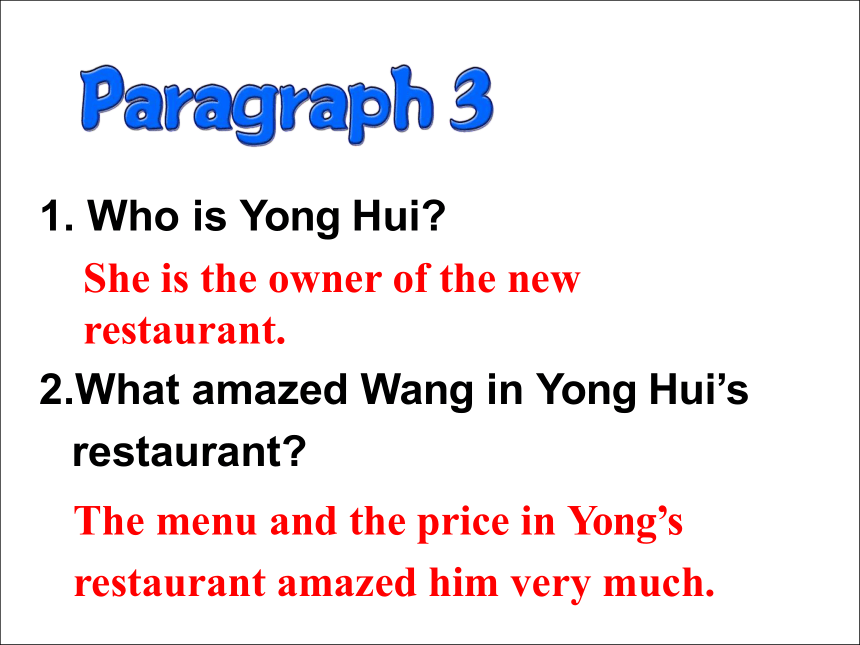
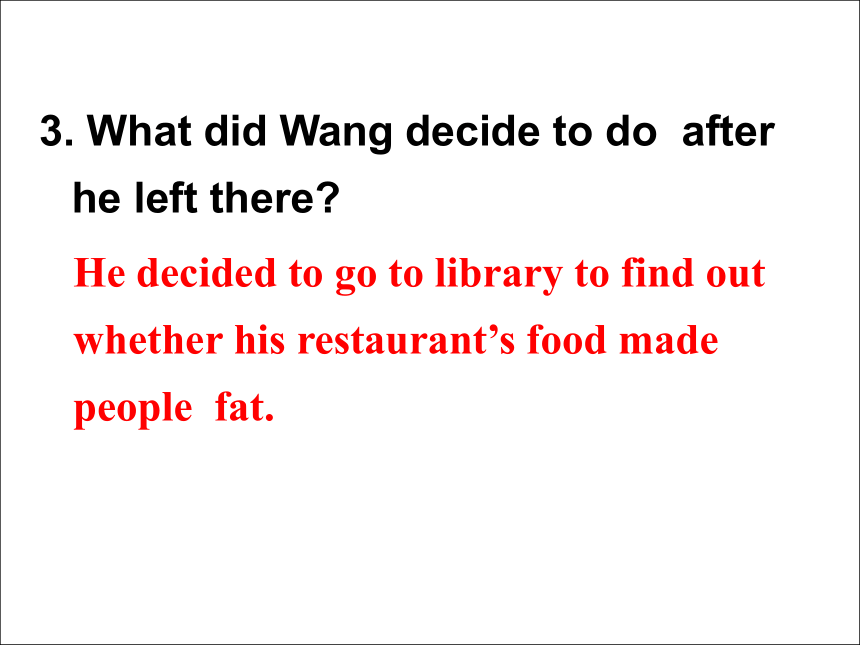
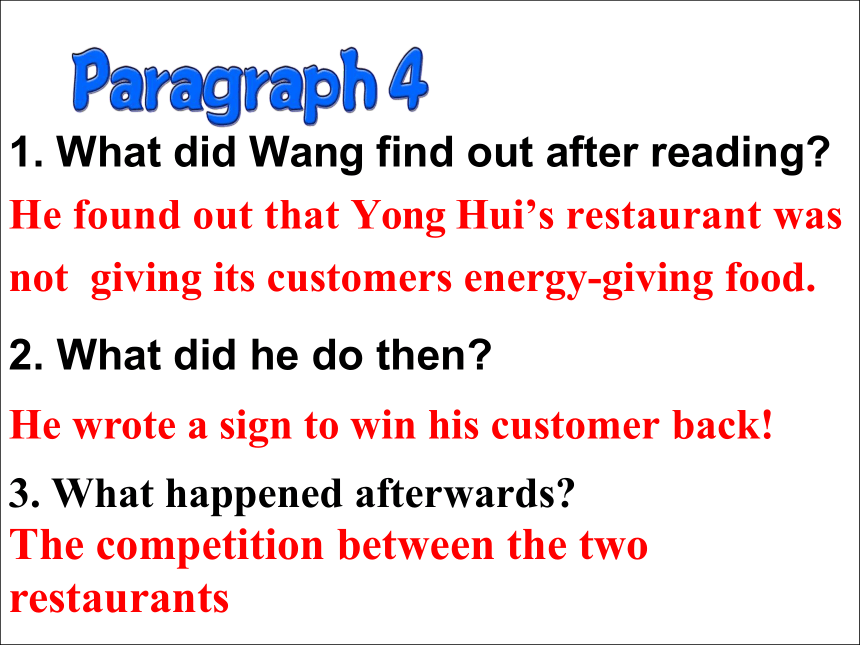
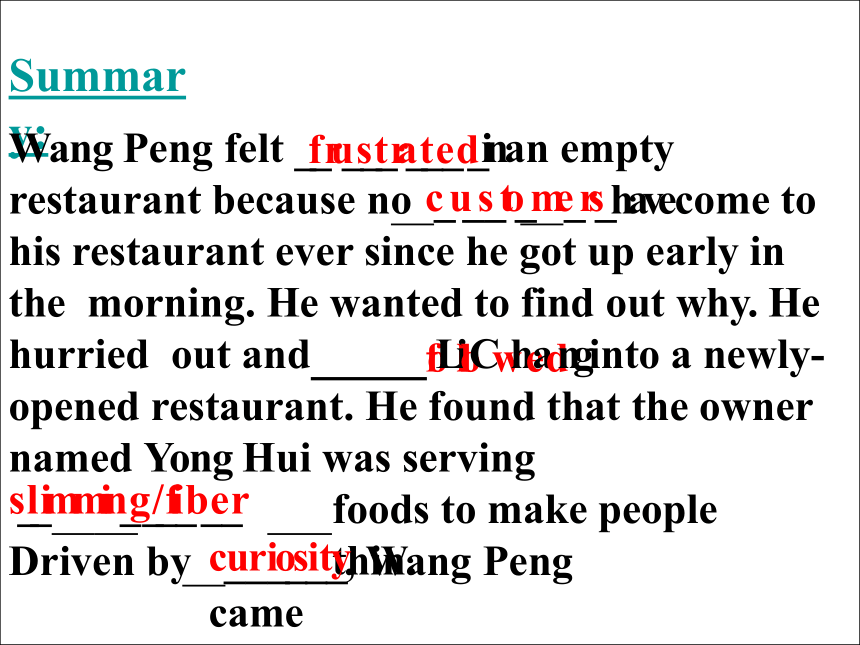
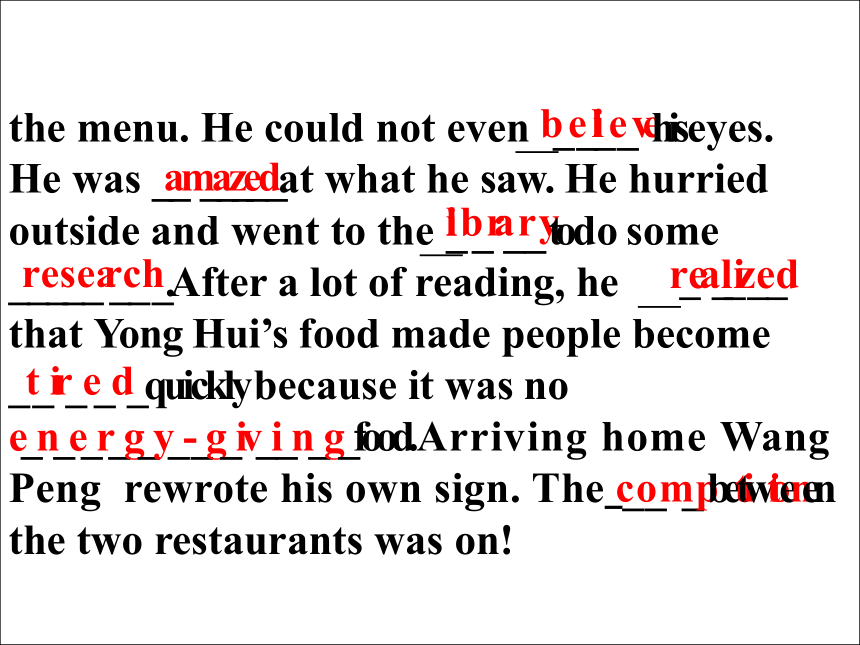
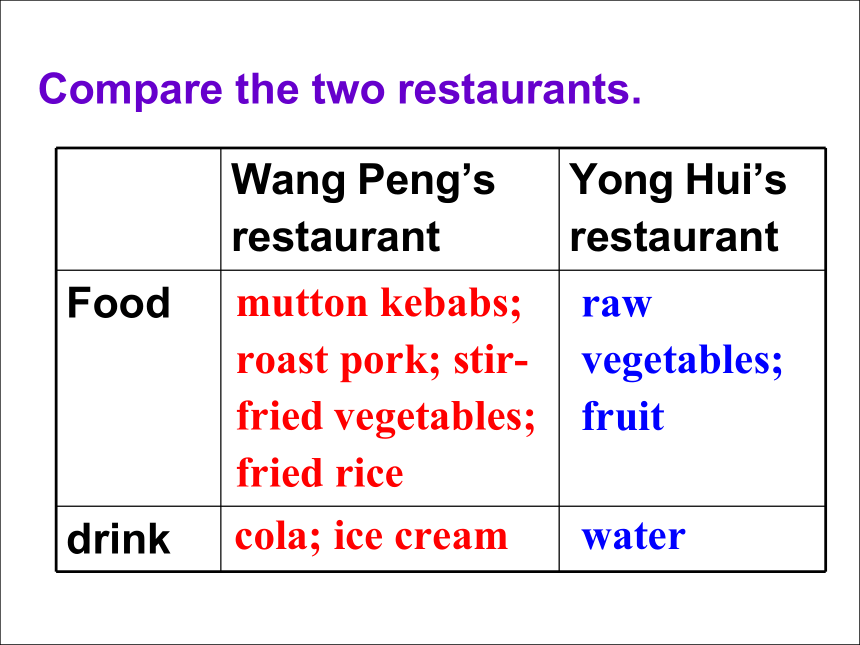
文档简介
课件71张PPT。COME AND EAT HERE (1)Wang Peng is worried because hisHe follows his friend to a newlyopened restaurant which is very popular.Worried, he does some research to winhis customers back.A. How many parts can the passage be divided into? Write down each main idea. Part 1 (L1to L10)restaurant is not as full as it usually is. Part 2 (L11to L28)Part 3 (L29to end)Skimming:B. According to the exercise above, try to write down the main idea of
the text.
Wang Peng’s restaurant became
bemcaputyse a new one had taken his regular c_u_staowmaeyr,sand he wanted to
imp_ro_v_eit to win his customers back.Read the passage carefully and answer the questions one paragraph by one paragraph.
1. Who is Wang Peng?
He is a restaurant keeper.Carefully reading:What happened on that strange morning? There was no customer in his restaurant that morning, which was unnatural.
How do you like the food in his restaurant?
It is delicious but it can make us get fat quickly. What did Wang see when he followed Li Chang?
He saw that a new restaurant was opened and there was a sign at the door.
What kind of food was served in this restaurant?
Only slimming food was served there.Who is Yong Hui?
She is the owner of the new restaurant.
What amazed Wang in Yong Hui’s restaurant?
The menu and the price in Yong’s restaurant amazed him very much.3. What did Wang decide to do after he left there?
He decided to go to library to find out whether his restaurant’s food made people fat.1. What did Wang find out after reading? He found out that Yong Hui’s restaurant was not giving its customers energy-giving food.What did he do then?
He wrote a sign to win his customer back!
What happened afterwards?
The competition between the two restaurants
was on.Summary:foods to make people thin.Driven by c_u_ri_o_s_it_y, Wang Peng came
_fo_r_w_a_rd to take a close atWang Peng felt _f_ru_s_t_ra_t_e_d_in an empty restaurant because no c_u_s_to_me_rs_have come to his restaurant ever since he got up early in the morning. He wanted to find out why. He hurried out and foLliloCwheadng into a newly- opened restaurant. He found that the owner named Yong Hui was servings_l_immin_g_/_fi_b_e_rthe menu. He could not even b_e_li_e_vehis eyes. He was _a_m_a_z_e_d_ at what he saw. He hurried outside and went to the li_b_ra_r_yto do some_r_e_s_e_ar_c_h_. After a lot of reading, her_ea_l_iz_e_dthat Yong Hui’s food made people become
_t_ir_e_d_quickly because it was no
e_n_e_r_g_y_-_g_iv_i_n_g_food. Arriving home Wang Peng rewrote his own sign. The c_o_m_pbettiwtioenen the two restaurants was on!Compare the two restaurants.到这里来用餐吧(1)王鹏坐在他那空荡荡的餐馆里,感到很沮丧。 这个上午真是怪的很。通常他很早就起床,准备 他的菜肴—烤羊肉串、烤猪肉、炒菜和炒饭。然 后到午饭时分,这些菜都会卖完。到了这个时候 他的餐馆本该宾客盈门的,但今天却不是!为什 么会这样?发生了什么事?他想起了他用滚烫的 精制油烹制的羊肉串、牛排和腊肉。他的可乐又 甜又冷,冰激凌用牛奶、奶油和水果制成的。他 想:“再没有比这些更好吃的了”。突然间,他 看到自己的朋友李昌匆匆地走过。他喊道,“喂 老李!你还是吃老一套的吧?”可是李昌似乎没 有听到。怎么会事呢?要是李昌不像往常那样到 他店里吃饭,那问题一定严重了。王鹏跟着李昌来到街尾一家新开张的小餐馆。门口 的标牌写着这样一些字:“肥腻的东西吃厌了吧!想变 瘦吗?请到雍慧减肥餐馆来。此地只供应减肥食品,让 你恢复苗条!”
王鹏受到好奇心的驱使,走了进去。里面坐满了人。 店老板,一个清瘦的女人走上前来说道:“欢迎光临! 我叫雍慧。您要是每天来这儿用餐,我可以保证在两周 内去掉您的全部脂肪,”然后,她递给王鹏一张菜谱, 菜谱上有很少几样食物和饮料:米饭、蘸醋吃的生蔬菜 水果和水。王鹏对此感到吃惊,特别是对它们的价格。 这比在他的餐馆里吃一顿好饭花的钱还要多。他几乎不 能相信他的眼睛!他甩了菜谱就急急往外走。在回家的 路上,他想起了自己的菜谱。那些菜让人发胖了吗?也 许他该去图书馆查查看。他可不能让雍慧哄骗人们后跑 掉。他最好做一番调查!在图书馆,王鹏很惊讶地发现,他餐馆 的食物脂肪含量太高,而雍慧餐馆的食物 脂肪含量又太少。尽管顾客吃她的餐馆里 的饭会变得苗条,但他们摄取不到足够的 热量来保持健康,很快就会感到疲乏。开 车回家时,王鹏觉得又有了希望。也许写 个新的招牌、打点折,能够赢回顾客吧。 于是他写道:“想健康又精力旺盛吗?到 这里来用餐吧!今天打折!我们的食物能 够给您提供一整天所需的热量!”
这两家餐馆之间的竞争开始了!full of people.2. Yong Hui could make people thin in two weeks by giving them a good diet.It would take longer than that.TF1 Tick the correct answers.
1. Usually Wang Peng’s restaurant was3. Wang Peng’s regular customersoften became fat.T4. Yong Hui’s menu gave customers more energy-giving food. F
No. it gave them protective food but no energy-giving or body- building food.5. Wang Peng’s menu gave customersFmore protective food. His menu gave customers energy-giving food.
6. Wang Peng decided to compete with Yong Hui by copying her menu. F
He decided to advertise the benefits of his menu!2 In your own words explain the following sentences.1 Something terrible must have happened if Li Chang was not coming to eat in his restaurant as he always did.
Li Chang always came to his restaurant so if he did not, it meant that something serious had happened to stop him.He could not have Yong Hui getting away with telling people lies!
He did not want Yong Hui to tell lies and people to believe her.
Perhaps with a discount and a new sign he could win his customers back.
If he gave his customers cheaper prices and advertised the benefits of his menu, perhaps his customers would return.3 Read the Warming up and the passage again and write out your answers.____________________________1 The weakness of the diet in Wang Peng’s restaurant was that it did not give
_.__________________________________________________________________________________The strength of the diet in Wang Peng’s restaurant was that it provided
_.
The weakness of the diet in Yong Hui’s restaurant was that it did not give
.
The strength of the diet in Yong Hui’s restaurant was that it provided
.Discuss these questions in pairs.1 What do you think Wang Peng will provide to win his customers back?
①Wang Peng will offer more protective food with his meals such as salad.
②He will cook his food in less oil.
③He will stop serving ice cream and cola because both of those have too much fat or sugar.2 How do you think the story will end?
① Wang Peng will lose his restaurant.
② Yong Hui will come to his restaurant and become very angry with him.
③ Yong Hui’s customers will become so tired they will return to Wang Peng’s restaurant.New words and expressions: frustrated: worried or angry barbecued mutton kebab: 烤羊肉串 roast pork: 烤猪肉
fried rice: 炒饭
slim: thin but attractive
curiosity: the desire to know about somethingLanguage pointsraw: not cooked
be amazed at: be surprised at
get away with: not be punished for something research: serious study of a subject
customer: here means someone who goes to the restaurant
fit: healthy1. Everybody has to eat, but do you eat a healthy diet?
diet n. 饮食,食物
diet指的是习惯的食物或规定的食物,特指维 持健康的定量或定质的食物。
food是一般的用语,凡能吃能喝的具有营养 的东西都称为food。
强调种类时,food 可用复数。Proper d_ie_t_ and exercise are both important for health.
Many sweet f_o_o_d_s_ are on sale in the store.
Milk is the _f_o_o_d_ for babies.【常用表达】
balanced / healthy / poor diet 均衡的/健康的/不良的饮食 vegetarian / high-fibre diet 素食/高纤维的饮食
a diet of fish / fruit / potatoes 只吃鱼/水果/土豆的饮食 be on a diet 节食2. What will you happen to you if you don’t eat a balanced diet?
balance作动词,意为“均衡,权衡,保 持平衡”。
e.g. Try to balance your diet by eating more fruit and less meat.
You have to balance the advantages of living in a big city against the disadvantages.balance作名词,意为“天平,平衡”。
e.g. Tom lost his balance and tipped backward in the chair.
The company’s success is reflected in its healthy bank balance.【常用表达】
keep / lose one’s balance 保持/失去平衡be off balance out of balance
a sense of balance使失去平衡 失去平衡 平衡感the balance of nature 自然生态平衡
balance beam 平衡木
a favorable balance 入多于出
an unfavorable balance 入不敷出3. Wang Peng sat in his empty restaurant feeling very frustrated.
-ing形式短语做伴随状语。
e.g. He placed two tables together, spreading all the papers out on them. She buried her head under the pillow,
crying.frustrated是形容词,意为“ 失望 的,失意的”
e.g. He feels frustrated and angry.
他感到既失意又恼火。
frustrate v. 使挫败, 使不成功
e.g. The bad weather frustrates our hopes of having a picnic.
坏天气使我们野餐的愿望无法实现。4. By now his restaurant ought to be full of people.
ought (not) to do …= should (not) do … should have done 本该做(却未做)=ought to have done sth.
e.g. I feel that we ought to accept his
proposal. 我觉得我们应该接受他的建议.
He ought to have kept his promise.
他原本应该遵守自己的诺言。5. “Nothing could be better,” he thought.
= All his foods could be best.
他想, “再没有比这些更好吃的了”。
此句是用比较级的否定形式表示最高级含义。
e.g. — How are you getting on?
你怎么样?
— Nothing could be better.
再好不过了。Did you sleep well last night?
Never better, like a rock.(再好不过) Nobody loved money better than he.
I think nothing is more pleasant than
traveling.
How did your father feel when he saw what a mess you had made?
He can’t be a_n_g_ri_e_r_. (angry)6. Something terrible must have happened if Li Chang was not coming to eat in his restaurant as he always did.
[点拔] 此句是一个主从复合句。主句为 Something terrible must have happened; 从 句是由if引导的条件状语从句, 即if Li Chang was ... restaurant; as he always did是 由as引导的方式状语从句。must have happened表示对已经发生的事 进行肯定的猜测, 意为“一定做了某事”。 其疑问形式是can / could提前, 否定形式
为: can’t / couldn’t have done。
e.g. She must have arrived home by now. Judging from her appearance and manner, she couldn’t have been over fifty years old.7. lose weight 减肥
put on/ gain weight 增肥
by weight 按重量
in weight 在重量上
watch one’s weight 控制体重 take a weight off sb’s mind 使某人如释重负8. Curiosity drove Wang Peng inside.
curiosity: 好奇心;求知欲 curious adj. be curious about… drive: vt. 驱赶 (动物), 驱使…… The terrible noise drove me mad.curious: adjbe curious about sth.
对某事物好奇
be curious to do sth. 好奇做某事curiosity
n. 好奇心 求知欲
奇物 罕见而有趣之物 out of curiosity出于好奇 with curiosity好奇地 satisfy one’s curiosity
满足某人的好奇心
have/show curiosity about sth/ to do sth
对…好奇9. Wang Peng was amazed at this and especially at the prices.
amaze v.
(1) to fill with great surprise 吃惊,使吃惊
e.g. It amazed me to hear that you were leaving.
(2) be amazed at….
对……感到惊讶, 惊愕
e.g. You would be amazed at how difficult it was.10. He could not have Yong Hui getting away with telling people lies!
a) have sb. doing
allow or tolerate (sth). 表示允许或 容忍(某事物)发生。
此处的have用在否定句中, 特别是 用在will not, can not等之后。e.g. I won’t have you saying so.
我不容许你这样说。
He won’t have his daughter arriving home late.
他不容许女儿晚回家。
b) get away with doing sth. (informal): not be punished for sth.
不因某事受惩罚e.g. I won’t have you getting away with cheating in the exam.
我不能容忍(允许)你考试作弊而 不受处罚。
get away with sth.
steal sth. and escape with it
偷携某物潜逃11. Perhaps with a discount and a new sign he could win his customers back.
win sth. / sb. back 赢回;重新获得。
e.g. The party is struggling to win back voters who have been disappointed by recent scandals.
该党正力争赢回因其最近的丑闻而感到 失望的选民。The team finally won back the championship after two decades.
这支球队最终赢回了阔别20年的冠 军头衔。
[拓展] win over(通过劝说或示好以)获 得(支持或友谊);把……争取过来。e.g. We’ll be working hard to win over the undecided voters.
我们将努力把犹豫未决的选民争取过来。 win through (= win out) 摆脱困境;终获成 功。
e.g. As in most of his films, it’s good guys who win through in the end.
正像他的大多数电影一样,好人最终 获得胜利。The competition between the two restaurants was on!
on作副词与be连用时,可以表示以 下几个意思:
(电灯、水等)开着
正在进行,举行
上演,演出① 灯都亮着。The lights were all on.
② 他们家的电视总是开着。
The TV is always on in their house.
③ 电影院在上演什么片子? What’s on at the movie?
④ 我到电影院的时候,电影已经开演五 分 钟了。
The film had been on for five minutes
when I got to the cinema.13. The strength of the diet in Wang Peng’s restaurant was that ...
strength
[观察] 阅读下列各句,并观察strength在 句中的含义。
1) He pushed against the rock with all hisstrength.
他使出全力推岩石。2) She has a remarkable inner strength.她有出众的意志力。力量;力气勇气;决心3) Political power depends upon economicstrength.政治实力取决于经济实力。
4) The new weapon’s strength lies in itsaccuracy.这种新型武器的优势在于其精确性。影响力;实力;威力优势[拓展]
on the strength of sth.
在……的影响或帮助下
e.g. I got the job on the strength of her recommendation.
在她的推荐下,我得到了这份工作。strengthen vt. & vi. 加强;强化
e.g. The organization’s aim is to strengthen the cultural ties between China and France.
这个组织旨在加强中法两国之间的
文化联系。not to be punished forFind words and expressions from the text that mean the same.
1. l_i_e something that you say that you know is not true.2. _g_e_t_a_w_a_y w_i_th somethingthe strong wish to know about3. r_a_w uncooked_c_u_r_io_s_i_ty something
_c_u_s_to_me_r_ someone who buys things or services from a shop, company, etc
_b_e_n_e_f_it a particular quality that gives someone or something an advantage.Fill in the blanks with words from the left box and paraphrase the italicized parts using the phrases from the right box.balanced diet raw slim ought to energetic
lose weight lose heart lose interest lose facelose weight
Julie wanted to become thinner. She knew she o_u_gheat tomore vegetables and fruit but little meat. However, as she was so afraid of being laughed at by her friends, she did not consult a doctor but lived on a
of ricdei,e_t vegetrabwles, bananas and lemons. Three weeks later, she found
she weighed as much as ever.losing faceto visit her friends any more. Luckily, herbest friend Fred came to see her and encouraged her to exercise, eat a dbiaeltanacnedenjoy life again. Soon Julie became amazingly e_n_e_rgaentdic !
Sshliemfelt very happy.lost interest in visitinglost heart
She felt so sad and hopeless about herself
and her behaviour changed. She didn’t dare to face her boyfriend and she was unwillingDo the underlined letters in each group have the same pronunciation? Tick the odd one out. Then check if the words in each group refer tothe same kind of food. Cross out the odd one and give your reasons.
1. peach cream pear bean
fat and all the others are fruit2. butter nut3. bacon hamsugar mutton
meat and all the others are energy-giving food
cabbage lambvegetable and all the others are meat
4. lemon eggplant strawberry watermelon
vegetable and all the others are fruitIn pairs make up a dialogue about food you like or dislike, using the expressions below and as many food words as you know.
My favourite food/fruit/meat is … I’m fond of …
I don’t often eat .. I really hate …
I can’t stand …
… make me gain/lose weightfried chicken roast duck lemon beef steamed fish fried eggplant boiled eggssmoked chicken barbecued mutton sweet and sour fish creamed potatoes cucumber salad
stir-fried mushroomsExample:
A: Do you know how to make soup?
B: Yes, I put in mushrooms, tomatoes and eggs to make a vegetable soup.
A: Oh, I can’t stand tomatoes, …Sample dialogue
A: What’s your favourite food? I’m really fond of roast duck.
B: My favourite food is roast mutton and cold vinegar fish.
A: What do you hate?
B: I really hate spicy food. It upsets my stomach and makes me feel ill.A: I’m so sorry to hear that! I can’t stand boiled eggs myself.
B: Really? I love them. If you eat boiled
eggs with smocked chicken and cucumber salad, they taste delicious.
A: I don’t often eat chicken although I know it has low fat and you won’t gain weight.B: Are you worried about gaining weight too? That’s why I’ve stopped eating fried
food. It’s really sad because I love fried eggplant with fried chicken.
A: Never mind. It’ll be worth it when you’re elegant and thin!
B: I hope so.Find the sentences containing modal verbs in the reading passage.Then by lunchtime they would all be sold. (Possibility)
What could have happened? (Possibility)
Nothing could be better. (Possibility)
Something terrible must have happened if …(Guessing)He could not believe his eyes. (Ability)
He could not have Yong Hui getting away with telling …(Intention)
Perhaps he should go to the library and find out. (Duty)
He had better do some research! (Duty)
Even though her customers might get thin after eating Yong Hui’s food, … (Possibility)
They would become tired very quickly. (Possibility)
the text.
Wang Peng’s restaurant became
bemcaputyse a new one had taken his regular c_u_staowmaeyr,sand he wanted to
imp_ro_v_eit to win his customers back.Read the passage carefully and answer the questions one paragraph by one paragraph.
1. Who is Wang Peng?
He is a restaurant keeper.Carefully reading:What happened on that strange morning? There was no customer in his restaurant that morning, which was unnatural.
How do you like the food in his restaurant?
It is delicious but it can make us get fat quickly. What did Wang see when he followed Li Chang?
He saw that a new restaurant was opened and there was a sign at the door.
What kind of food was served in this restaurant?
Only slimming food was served there.Who is Yong Hui?
She is the owner of the new restaurant.
What amazed Wang in Yong Hui’s restaurant?
The menu and the price in Yong’s restaurant amazed him very much.3. What did Wang decide to do after he left there?
He decided to go to library to find out whether his restaurant’s food made people fat.1. What did Wang find out after reading? He found out that Yong Hui’s restaurant was not giving its customers energy-giving food.What did he do then?
He wrote a sign to win his customer back!
What happened afterwards?
The competition between the two restaurants
was on.Summary:foods to make people thin.Driven by c_u_ri_o_s_it_y, Wang Peng came
_fo_r_w_a_rd to take a close atWang Peng felt _f_ru_s_t_ra_t_e_d_in an empty restaurant because no c_u_s_to_me_rs_have come to his restaurant ever since he got up early in the morning. He wanted to find out why. He hurried out and foLliloCwheadng into a newly- opened restaurant. He found that the owner named Yong Hui was servings_l_immin_g_/_fi_b_e_rthe menu. He could not even b_e_li_e_vehis eyes. He was _a_m_a_z_e_d_ at what he saw. He hurried outside and went to the li_b_ra_r_yto do some_r_e_s_e_ar_c_h_. After a lot of reading, her_ea_l_iz_e_dthat Yong Hui’s food made people become
_t_ir_e_d_quickly because it was no
e_n_e_r_g_y_-_g_iv_i_n_g_food. Arriving home Wang Peng rewrote his own sign. The c_o_m_pbettiwtioenen the two restaurants was on!Compare the two restaurants.到这里来用餐吧(1)王鹏坐在他那空荡荡的餐馆里,感到很沮丧。 这个上午真是怪的很。通常他很早就起床,准备 他的菜肴—烤羊肉串、烤猪肉、炒菜和炒饭。然 后到午饭时分,这些菜都会卖完。到了这个时候 他的餐馆本该宾客盈门的,但今天却不是!为什 么会这样?发生了什么事?他想起了他用滚烫的 精制油烹制的羊肉串、牛排和腊肉。他的可乐又 甜又冷,冰激凌用牛奶、奶油和水果制成的。他 想:“再没有比这些更好吃的了”。突然间,他 看到自己的朋友李昌匆匆地走过。他喊道,“喂 老李!你还是吃老一套的吧?”可是李昌似乎没 有听到。怎么会事呢?要是李昌不像往常那样到 他店里吃饭,那问题一定严重了。王鹏跟着李昌来到街尾一家新开张的小餐馆。门口 的标牌写着这样一些字:“肥腻的东西吃厌了吧!想变 瘦吗?请到雍慧减肥餐馆来。此地只供应减肥食品,让 你恢复苗条!”
王鹏受到好奇心的驱使,走了进去。里面坐满了人。 店老板,一个清瘦的女人走上前来说道:“欢迎光临! 我叫雍慧。您要是每天来这儿用餐,我可以保证在两周 内去掉您的全部脂肪,”然后,她递给王鹏一张菜谱, 菜谱上有很少几样食物和饮料:米饭、蘸醋吃的生蔬菜 水果和水。王鹏对此感到吃惊,特别是对它们的价格。 这比在他的餐馆里吃一顿好饭花的钱还要多。他几乎不 能相信他的眼睛!他甩了菜谱就急急往外走。在回家的 路上,他想起了自己的菜谱。那些菜让人发胖了吗?也 许他该去图书馆查查看。他可不能让雍慧哄骗人们后跑 掉。他最好做一番调查!在图书馆,王鹏很惊讶地发现,他餐馆 的食物脂肪含量太高,而雍慧餐馆的食物 脂肪含量又太少。尽管顾客吃她的餐馆里 的饭会变得苗条,但他们摄取不到足够的 热量来保持健康,很快就会感到疲乏。开 车回家时,王鹏觉得又有了希望。也许写 个新的招牌、打点折,能够赢回顾客吧。 于是他写道:“想健康又精力旺盛吗?到 这里来用餐吧!今天打折!我们的食物能 够给您提供一整天所需的热量!”
这两家餐馆之间的竞争开始了!full of people.2. Yong Hui could make people thin in two weeks by giving them a good diet.It would take longer than that.TF1 Tick the correct answers.
1. Usually Wang Peng’s restaurant was3. Wang Peng’s regular customersoften became fat.T4. Yong Hui’s menu gave customers more energy-giving food. F
No. it gave them protective food but no energy-giving or body- building food.5. Wang Peng’s menu gave customersFmore protective food. His menu gave customers energy-giving food.
6. Wang Peng decided to compete with Yong Hui by copying her menu. F
He decided to advertise the benefits of his menu!2 In your own words explain the following sentences.1 Something terrible must have happened if Li Chang was not coming to eat in his restaurant as he always did.
Li Chang always came to his restaurant so if he did not, it meant that something serious had happened to stop him.He could not have Yong Hui getting away with telling people lies!
He did not want Yong Hui to tell lies and people to believe her.
Perhaps with a discount and a new sign he could win his customers back.
If he gave his customers cheaper prices and advertised the benefits of his menu, perhaps his customers would return.3 Read the Warming up and the passage again and write out your answers.____________________________1 The weakness of the diet in Wang Peng’s restaurant was that it did not give
_.__________________________________________________________________________________The strength of the diet in Wang Peng’s restaurant was that it provided
_.
The weakness of the diet in Yong Hui’s restaurant was that it did not give
.
The strength of the diet in Yong Hui’s restaurant was that it provided
.Discuss these questions in pairs.1 What do you think Wang Peng will provide to win his customers back?
①Wang Peng will offer more protective food with his meals such as salad.
②He will cook his food in less oil.
③He will stop serving ice cream and cola because both of those have too much fat or sugar.2 How do you think the story will end?
① Wang Peng will lose his restaurant.
② Yong Hui will come to his restaurant and become very angry with him.
③ Yong Hui’s customers will become so tired they will return to Wang Peng’s restaurant.New words and expressions: frustrated: worried or angry barbecued mutton kebab: 烤羊肉串 roast pork: 烤猪肉
fried rice: 炒饭
slim: thin but attractive
curiosity: the desire to know about somethingLanguage pointsraw: not cooked
be amazed at: be surprised at
get away with: not be punished for something research: serious study of a subject
customer: here means someone who goes to the restaurant
fit: healthy1. Everybody has to eat, but do you eat a healthy diet?
diet n. 饮食,食物
diet指的是习惯的食物或规定的食物,特指维 持健康的定量或定质的食物。
food是一般的用语,凡能吃能喝的具有营养 的东西都称为food。
强调种类时,food 可用复数。Proper d_ie_t_ and exercise are both important for health.
Many sweet f_o_o_d_s_ are on sale in the store.
Milk is the _f_o_o_d_ for babies.【常用表达】
balanced / healthy / poor diet 均衡的/健康的/不良的饮食 vegetarian / high-fibre diet 素食/高纤维的饮食
a diet of fish / fruit / potatoes 只吃鱼/水果/土豆的饮食 be on a diet 节食2. What will you happen to you if you don’t eat a balanced diet?
balance作动词,意为“均衡,权衡,保 持平衡”。
e.g. Try to balance your diet by eating more fruit and less meat.
You have to balance the advantages of living in a big city against the disadvantages.balance作名词,意为“天平,平衡”。
e.g. Tom lost his balance and tipped backward in the chair.
The company’s success is reflected in its healthy bank balance.【常用表达】
keep / lose one’s balance 保持/失去平衡be off balance out of balance
a sense of balance使失去平衡 失去平衡 平衡感the balance of nature 自然生态平衡
balance beam 平衡木
a favorable balance 入多于出
an unfavorable balance 入不敷出3. Wang Peng sat in his empty restaurant feeling very frustrated.
-ing形式短语做伴随状语。
e.g. He placed two tables together, spreading all the papers out on them. She buried her head under the pillow,
crying.frustrated是形容词,意为“ 失望 的,失意的”
e.g. He feels frustrated and angry.
他感到既失意又恼火。
frustrate v. 使挫败, 使不成功
e.g. The bad weather frustrates our hopes of having a picnic.
坏天气使我们野餐的愿望无法实现。4. By now his restaurant ought to be full of people.
ought (not) to do …= should (not) do … should have done 本该做(却未做)=ought to have done sth.
e.g. I feel that we ought to accept his
proposal. 我觉得我们应该接受他的建议.
He ought to have kept his promise.
他原本应该遵守自己的诺言。5. “Nothing could be better,” he thought.
= All his foods could be best.
他想, “再没有比这些更好吃的了”。
此句是用比较级的否定形式表示最高级含义。
e.g. — How are you getting on?
你怎么样?
— Nothing could be better.
再好不过了。Did you sleep well last night?
Never better, like a rock.(再好不过) Nobody loved money better than he.
I think nothing is more pleasant than
traveling.
How did your father feel when he saw what a mess you had made?
He can’t be a_n_g_ri_e_r_. (angry)6. Something terrible must have happened if Li Chang was not coming to eat in his restaurant as he always did.
[点拔] 此句是一个主从复合句。主句为 Something terrible must have happened; 从 句是由if引导的条件状语从句, 即if Li Chang was ... restaurant; as he always did是 由as引导的方式状语从句。must have happened表示对已经发生的事 进行肯定的猜测, 意为“一定做了某事”。 其疑问形式是can / could提前, 否定形式
为: can’t / couldn’t have done。
e.g. She must have arrived home by now. Judging from her appearance and manner, she couldn’t have been over fifty years old.7. lose weight 减肥
put on/ gain weight 增肥
by weight 按重量
in weight 在重量上
watch one’s weight 控制体重 take a weight off sb’s mind 使某人如释重负8. Curiosity drove Wang Peng inside.
curiosity: 好奇心;求知欲 curious adj. be curious about… drive: vt. 驱赶 (动物), 驱使…… The terrible noise drove me mad.curious: adjbe curious about sth.
对某事物好奇
be curious to do sth. 好奇做某事curiosity
n. 好奇心 求知欲
奇物 罕见而有趣之物 out of curiosity出于好奇 with curiosity好奇地 satisfy one’s curiosity
满足某人的好奇心
have/show curiosity about sth/ to do sth
对…好奇9. Wang Peng was amazed at this and especially at the prices.
amaze v.
(1) to fill with great surprise 吃惊,使吃惊
e.g. It amazed me to hear that you were leaving.
(2) be amazed at….
对……感到惊讶, 惊愕
e.g. You would be amazed at how difficult it was.10. He could not have Yong Hui getting away with telling people lies!
a) have sb. doing
allow or tolerate (sth). 表示允许或 容忍(某事物)发生。
此处的have用在否定句中, 特别是 用在will not, can not等之后。e.g. I won’t have you saying so.
我不容许你这样说。
He won’t have his daughter arriving home late.
他不容许女儿晚回家。
b) get away with doing sth. (informal): not be punished for sth.
不因某事受惩罚e.g. I won’t have you getting away with cheating in the exam.
我不能容忍(允许)你考试作弊而 不受处罚。
get away with sth.
steal sth. and escape with it
偷携某物潜逃11. Perhaps with a discount and a new sign he could win his customers back.
win sth. / sb. back 赢回;重新获得。
e.g. The party is struggling to win back voters who have been disappointed by recent scandals.
该党正力争赢回因其最近的丑闻而感到 失望的选民。The team finally won back the championship after two decades.
这支球队最终赢回了阔别20年的冠 军头衔。
[拓展] win over(通过劝说或示好以)获 得(支持或友谊);把……争取过来。e.g. We’ll be working hard to win over the undecided voters.
我们将努力把犹豫未决的选民争取过来。 win through (= win out) 摆脱困境;终获成 功。
e.g. As in most of his films, it’s good guys who win through in the end.
正像他的大多数电影一样,好人最终 获得胜利。The competition between the two restaurants was on!
on作副词与be连用时,可以表示以 下几个意思:
(电灯、水等)开着
正在进行,举行
上演,演出① 灯都亮着。The lights were all on.
② 他们家的电视总是开着。
The TV is always on in their house.
③ 电影院在上演什么片子? What’s on at the movie?
④ 我到电影院的时候,电影已经开演五 分 钟了。
The film had been on for five minutes
when I got to the cinema.13. The strength of the diet in Wang Peng’s restaurant was that ...
strength
[观察] 阅读下列各句,并观察strength在 句中的含义。
1) He pushed against the rock with all hisstrength.
他使出全力推岩石。2) She has a remarkable inner strength.她有出众的意志力。力量;力气勇气;决心3) Political power depends upon economicstrength.政治实力取决于经济实力。
4) The new weapon’s strength lies in itsaccuracy.这种新型武器的优势在于其精确性。影响力;实力;威力优势[拓展]
on the strength of sth.
在……的影响或帮助下
e.g. I got the job on the strength of her recommendation.
在她的推荐下,我得到了这份工作。strengthen vt. & vi. 加强;强化
e.g. The organization’s aim is to strengthen the cultural ties between China and France.
这个组织旨在加强中法两国之间的
文化联系。not to be punished forFind words and expressions from the text that mean the same.
1. l_i_e something that you say that you know is not true.2. _g_e_t_a_w_a_y w_i_th somethingthe strong wish to know about3. r_a_w uncooked_c_u_r_io_s_i_ty something
_c_u_s_to_me_r_ someone who buys things or services from a shop, company, etc
_b_e_n_e_f_it a particular quality that gives someone or something an advantage.Fill in the blanks with words from the left box and paraphrase the italicized parts using the phrases from the right box.balanced diet raw slim ought to energetic
lose weight lose heart lose interest lose facelose weight
Julie wanted to become thinner. She knew she o_u_gheat tomore vegetables and fruit but little meat. However, as she was so afraid of being laughed at by her friends, she did not consult a doctor but lived on a
of ricdei,e_t vegetrabwles, bananas and lemons. Three weeks later, she found
she weighed as much as ever.losing faceto visit her friends any more. Luckily, herbest friend Fred came to see her and encouraged her to exercise, eat a dbiaeltanacnedenjoy life again. Soon Julie became amazingly e_n_e_rgaentdic !
Sshliemfelt very happy.lost interest in visitinglost heart
She felt so sad and hopeless about herself
and her behaviour changed. She didn’t dare to face her boyfriend and she was unwillingDo the underlined letters in each group have the same pronunciation? Tick the odd one out. Then check if the words in each group refer tothe same kind of food. Cross out the odd one and give your reasons.
1. peach cream pear bean
fat and all the others are fruit2. butter nut3. bacon hamsugar mutton
meat and all the others are energy-giving food
cabbage lambvegetable and all the others are meat
4. lemon eggplant strawberry watermelon
vegetable and all the others are fruitIn pairs make up a dialogue about food you like or dislike, using the expressions below and as many food words as you know.
My favourite food/fruit/meat is … I’m fond of …
I don’t often eat .. I really hate …
I can’t stand …
… make me gain/lose weightfried chicken roast duck lemon beef steamed fish fried eggplant boiled eggssmoked chicken barbecued mutton sweet and sour fish creamed potatoes cucumber salad
stir-fried mushroomsExample:
A: Do you know how to make soup?
B: Yes, I put in mushrooms, tomatoes and eggs to make a vegetable soup.
A: Oh, I can’t stand tomatoes, …Sample dialogue
A: What’s your favourite food? I’m really fond of roast duck.
B: My favourite food is roast mutton and cold vinegar fish.
A: What do you hate?
B: I really hate spicy food. It upsets my stomach and makes me feel ill.A: I’m so sorry to hear that! I can’t stand boiled eggs myself.
B: Really? I love them. If you eat boiled
eggs with smocked chicken and cucumber salad, they taste delicious.
A: I don’t often eat chicken although I know it has low fat and you won’t gain weight.B: Are you worried about gaining weight too? That’s why I’ve stopped eating fried
food. It’s really sad because I love fried eggplant with fried chicken.
A: Never mind. It’ll be worth it when you’re elegant and thin!
B: I hope so.Find the sentences containing modal verbs in the reading passage.Then by lunchtime they would all be sold. (Possibility)
What could have happened? (Possibility)
Nothing could be better. (Possibility)
Something terrible must have happened if …(Guessing)He could not believe his eyes. (Ability)
He could not have Yong Hui getting away with telling …(Intention)
Perhaps he should go to the library and find out. (Duty)
He had better do some research! (Duty)
Even though her customers might get thin after eating Yong Hui’s food, … (Possibility)
They would become tired very quickly. (Possibility)
同课章节目录
